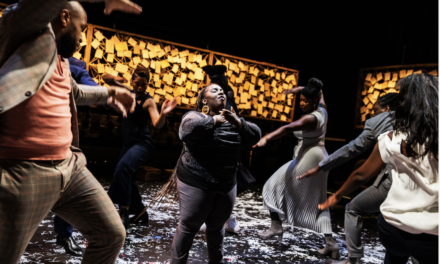by Adam Cohen
The quiet freemasonry of pride, time, companionship, and aging provides for a quiet but thought provoking production of Pulitzer Prize winner Alfred Uhry’s Driving Miss Daisy in Hoboken by Mile Square Theatre. It illustrates the friendship of an African American man and caucasion woman in the South, largely of convenience but overtime gelling into actual respect and love. Sadly, in today’s fractious time, it also highlights how far we have to go. And this understated but powerful production is a perfect representation of the power and craft of strong acting, writing, and theater.
Miss Daisy (Barbara Broughton) is an Atlanta widow who, after a spectacular car crash, is persuaded by her son, Boolie (Matthew Lawler) to take on a chauffeur in the person of Hoke Coleburn (Count Stovall). Over the momentous quarter-century from 1948 to 1973 embracing the civil rights movement and growing desegregation, we see how their rigid, professional relationship deepens into an amazing friendship.
The play is a series of short scenes. Uhry hints at the political changes American undergoes. The 1958 bombing of Atlanta’s oldest synagogue for its support of racial freedom prompts Hoke to observe that African-Americans have long been exposed to bigotry. This is counter-balanced by a later scene in which Miss Daisy’s son turns down an invitation to a Martin Luther King dinner fearing acceptance would jeopardize his business. Uhry never follows up a crucial moment when Miss Daisy teaches the unlettered Hoke the rudiments of reading. But the scenes alight into a gentle, vital, poetic friendship.
The beauty of the production is the three actors gracefulness and articulate chemistry. Though Lawler has the smallest part, he evokes a quiet exasperation at dealing with an aging, disapproving mother whom he loves wholeheartedly and generously. Broughton embues Miss Daisy with a fierce pride and willfulness. As a former elementary school teacher, Miss Daisy treats her son and driver as recalcitrant pupils.
Stovall’s Hoke brings out the quiet dignity of a man who has survived life’s humiliations but knows his own worth: there is real anger in the scene when he turns on his employer for inviting him, only at the very last second, to escort her to the Martin Luther King banquet. And equal Joy at leaving Georgia for the first time during a road trip to Alabama. It is a superb piece of acting artfully matched by Lawler and Broughton.
Unobtrusively directed by Mark Cirnigliaro, the actors lend Uhry’s tenuous play a transforming weight and substance. Uhry’s vignettes portray a classic clash of wills between an immovable object and an irresistible force that eventually melts into something like love. There’s a gentle restraint and maturity to the entire production. The simple, yet elegant set (Matthew J. Fick) reveal a cemetery plot, various cars, Boolie’s office and Daisy’s home.
When Miss Daisy’s steps slow, and Hoke hunches and walks with a cane, we feel a distinct chill of mortal attrition. As it affects Miss Daisy and Hoke. Ms. Broughton and Mr. Stovall have yet to shrink one bit.
Photos: Joe Epstein
The production in the distinctive jewel of a theater in Hoboken, runs through February 25th. Tickets and more information at:

























